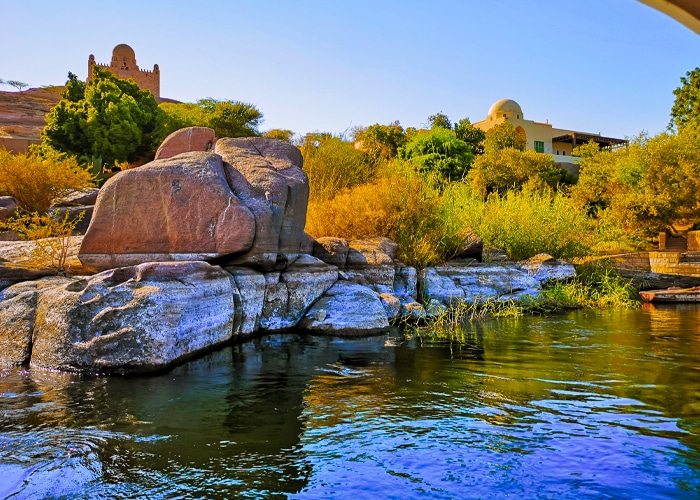
Elephantine Island
Elephantine Island, nestled in the heart of the Nile River in Aswan, is one of Egypt’s most captivating historical and cultural treasures. This island, with its rich history, stunning landscapes, and archaeological wonders, offers travelers a unique glimpse into ancient Egypt and Nubian heritage. Whether you’re a history enthusiast, a culture seeker, or simply looking to explore Egypt’s hidden gems, Elephantine Island should be at the top of your travel itinerary.
The Historical Significance of Elephantine Island
Elephantine Island has played a pivotal role in Egypt’s history for thousands of years. Its name derives from the ancient Egyptian word “Abu,” meaning elephant, as the island was once a major trading hub for ivory and other goods. The island’s strategic location made it a vital center for trade and military operations during ancient times.
One of the island’s most notable features is its connection to the ancient Egyptian god Khnum, the deity of the Nile’s source. The Temple of Khnum, located on the island, is a testament to the island’s religious importance. Visitors can explore the ruins of this temple, which date back to the Old Kingdom, and marvel at the intricate carvings and hieroglyphs that tell the story of this sacred site.
Archaeological Wonders on Elephantine Island
Elephantine Island is a treasure trove of archaeological discoveries. The island is home to the Aswan Museum, which houses a fascinating collection of artifacts, including pottery, tools, and statues that provide insight into the daily lives of ancient Egyptians and Nubians. The museum is located in the former home of Sir William Willcocks, the British engineer who designed the Aswan Dam.
Another must-see site on the island is the Nilometer, an ancient structure used to measure the Nile’s water levels. This ingenious device was crucial for predicting the annual flood, which determined the success of the harvest. The Nilometer on Elephantine Island is one of the best-preserved examples in Egypt and offers a fascinating look at the ingenuity of ancient Egyptian engineering.
Exploring the Nubian Village
One of the highlights of visiting Elephantine Island is the opportunity to experience the vibrant Nubian culture. The island is home to a traditional Nubian village, where visitors can interact with the friendly locals, learn about their customs, and even enjoy a cup of traditional Nubian tea. The brightly painted houses and narrow alleyways of the village provide a stark contrast to the ancient ruins, offering a unique blend of history and culture.
Elephantine Island and Its Connection to Other Egyptian Historical Sites
While Elephantine Island is a destination in its own right, it also serves as a gateway to other iconic historical sites in Egypt. Aswan, the city closest to the island, is home to the stunning Philae Temple, dedicated to the goddess Isis, and the Unfinished Obelisk, which provides a glimpse into ancient stone-cutting techniques.
From Aswan, travelers can embark on a Nile River cruise to Luxor, where they can explore the Valley of the Kings, Karnak Temple, and the Luxor Temple. Further north, Cairo offers the Pyramids of Giza, the Sphinx, and the Egyptian Museum, which houses an unparalleled collection of ancient artifacts.
Why Visit Elephantine Island in 2025?
As we look ahead to 2025, Elephantine Island continues to be a must-visit destination for travelers to Egypt. The island’s unique blend of history, culture, and natural beauty makes it a standout among Egypt’s many historical sites. Whether you’re exploring the ancient ruins, immersing yourself in Nubian culture, or simply enjoying the serene beauty of the Nile, Elephantine Island offers an unforgettable experience.
Tips for Visiting Elephantine Island
- Best Time to Visit: The ideal time to visit Elephantine Island is between October and April, when the weather is mild and pleasant. Summers in Aswan can be extremely hot, so plan accordingly.
- Getting There: Elephantine Island is easily accessible by ferry from Aswan. The short ride offers stunning views of the Nile and the surrounding landscape.
- Guided Tours: Consider hiring a local guide to enhance your visit. A knowledgeable guide can provide valuable insights into the island’s history and culture, making your experience even more enriching.
- What to Bring: Don’t forget to bring sunscreen, a hat, and plenty of water, especially if you’re visiting during the warmer months. Comfortable walking shoes are also a must, as you’ll be exploring uneven terrain.
- Respect Local Customs: When visiting the Nubian village, be mindful of local customs and traditions. Always ask for permission before taking photos of people or their homes.
Conclusion
Elephantine Island is a true gem in Egypt’s crown, offering a unique blend of history, culture, and natural beauty. Whether you’re a seasoned traveler or visiting Egypt for the first time, this island promises an unforgettable experience. As you plan your trip to Egypt in 2025, make sure to include Elephantine Island in your itinerary. Its ancient ruins, vibrant Nubian culture, and stunning Nile views will leave you with memories to last a lifetime.
So, pack your bags, grab your camera, and get ready to explore the enchanting Elephantine Island – a destination that truly embodies the magic of Egypt.




